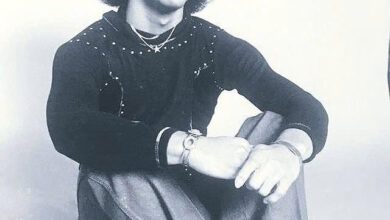Healing Through Song: How Rod Stewart’s Ballads Comfort the Brokenhearted
OPINION: This article may contain commentary which reflects the author's opinion.
For decades, Rod Stewart’s raspy voice and heartfelt lyrics have captured the emotions of countless listeners, especially those nursing a broken heart. His ballads, often marked by their blend of vulnerability, wisdom, and melody, have resonated deeply with audiences, providing solace in moments of emotional turmoil.
Stewart’s ability to weave personal stories with universal emotions is what makes his ballads timeless. Songs like “The First Cut Is the Deepest” and “I Don’t Want to Talk About It” have become anthems for those struggling with heartbreak. These songs not only acknowledge the pain of love lost but also offer a sense of understanding and camaraderie, as if Stewart himself is saying, “I’ve been there too.”
The Magic of “The First Cut Is the Deepest”
Originally written by Cat Stevens, “The First Cut Is the Deepest” became one of Stewart’s most iconic songs when he covered it in 1976. The song speaks to the rawness of early heartbreak and the difficulty of moving forward after a deep emotional wound. Stewart’s interpretation, with his signature voice and emotive delivery, added a layer of personal sincerity that has allowed the track to endure across generations.
Listeners are often drawn to the relatable lyrics, which express a struggle many have faced—the fear of opening up to love again after being hurt. This ballad comforts listeners by validating their feelings, reminding them that healing takes time.
“I Don’t Want to Talk About It”: Silence in Pain
Perhaps one of Stewart’s most poignant ballads, “I Don’t Want to Talk About It” delves into the quiet suffering of heartbreak. The song captures the struggle of those who, despite their pain, find it difficult to express their feelings. Its quiet, almost resigned tone speaks volumes to those who often can’t find the words to articulate their emotional wounds.
What makes this ballad stand out is its simplicity. Stewart doesn’t attempt to complicate the emotions—he lets the rawness of the lyrics and the melody do the work. For many listeners, this song becomes a soundtrack to their healing process, offering the space to sit in silence with their grief.
A Voice That Heals
What sets Stewart apart from other artists is his authenticity. He sings not just as a performer but as someone who has lived through love, loss, and redemption. His ballads don’t merely dwell on heartache; they offer a glimmer of hope, subtly reassuring listeners that they will get through it, just as he has.
The healing power of Stewart’s ballads lies in his honesty. Whether it’s the reflection on past loves in “Reason to Believe” or the wistful longing in “Have I Told You Lately,” Stewart’s songs remind us that while heartache is a part of life, so too is the possibility of healing and moving forward.
Why His Ballads Continue to Resonate
Rod Stewart’s ballads remain relevant because they speak to a universal truth: love, in all its forms, can be both beautiful and painful. His music doesn’t sugarcoat the emotional rollercoaster of relationships, nor does it wallow in despair. Instead, it walks the fine line between heartache and hope, providing a comforting companion for anyone going through the ups and downs of love.
In a world that often moves too fast to process feelings, Stewart’s ballads offer a moment of pause. They remind the brokenhearted that it’s okay to feel, to grieve, and eventually, to heal. Through his music, Stewart has given generations a way to process their emotions, proving that sometimes, a song is the best remedy for a broken heart.
Conclusion
Rod Stewart’s ballads are more than just music—they are a balm for the brokenhearted, offering understanding and comfort in the most vulnerable of times. Whether it’s through the gut-wrenching pain of “The First Cut Is the Deepest” or the quiet suffering of “I Don’t Want to Talk About It,” Stewart’s songs have an unparalleled ability to speak to the heart. For those navigating the rough seas of love, his ballads are a reminder that they are not alone—and that, eventually, the heart does heal.



